Seventeenth Sunday in Ordinary Time
July 29, 2012, Cycle B
Green priestly vestments symbolize hope and the vitality of
the life of faith.
Home Page
Liturgical
Year Cycle B 11-12
Introductory Acts Of Worship
The Entrance Prayers:
On Sunday, usually a hymn praising God
is sung in place of reciting a Psalm from the Bible which invites us to
enter more deeply into the mystery of God's love for us. The recited
weekday Psalm expresses a youthful heart and spirit, delighted that we may come
before the living God.
Entrance Song
/ Entrance Psalm (Antiphon)
Entrance Song Psalm 68:6-7, 36
God is in his holy place, God who unites
those who dwell in his house; he himself gives might and strength to his people.
The Priest Approaches and Kisses the Altar:
The
altar is a symbol of Christ. In it are cut five crosses to recall the five
wounds of Christ. The altar also represents the Church and has embedded in
it the relics of her saints. The priest comes to the altar to celebrate
the Sacrifice in the Church's name. Because of the glory surrounding the
altar upon which the divine Sacrifice will be made, the kiss of the priest
unites the Church to Christ, its Redeemer.
Priest:
In the name of the Father, and of the Son, and of the Holy Spirit.
All:
Amen.
Priest: The grace of our Lord Jesus Christ, and the love of God, and
the communion of the Holy Spirit be with you all.
All: And
with your spirit.
The Penitential Prayers:
We recognize our guilt for past sins,
express our sorrow for them, and ask that Mary, the angels, the saints, and our
brothers and sisters in Christ pray for the Lord God's mercy. (The priest
may select from several forms).
Priest and All: I
confess to almighty God and to you, my brothers and sisters, that I have greatly
sinned, in my thoughts and in my words, in what I have done and in what I have
failed to do, through my fault, through my fault, through my most grievous
fault; therefore I ask blessed Mary ever-Virgin, all the Angels and Saints, and
you , my brothers and sisters, to pray for me to the Lord our God.
The Absolution:
Priest: May almighty God have
mercy on us, forgive us our sins, and bring us to everlasting life.
All:
Amen.
The Gloria:
The Glory of God prayers have existed from
the second century. They repeat the angels praise of God which heralded
the birth of Christ on earth. Our praise is lifted again through the years
as we rejoice at His coming as Lord, God, the most high Jesus Christ, who at
Christmas took on our human nature while at the same time being the son of Man.
This ancient hymn expresses our recognition of God's glory and love. It
calls upon Christ as our holy and divine mediator, and the Holy Spirit who
forever binds us together in God's love.
Priest and All:
Glory to God in the highest, and peace to his people
on earth. Lord God, heavenly King, almighty God and Father, we worship
you, we give you thinks, we praise you for your glory. Lord Jesus Christ,
only son of the Father, Lord God, Lamb of God, you take away the sins of the
world: have mercy on us; you are seated at the right hand of the Father: receive
our prayer. For you alone are the Holy One, you alone are the Lord, you
alone are the Most High, Jesus Christ, with the Holy Spirit, in the glory of God
the Father. Amen.
The Collect:
The
priest lifts the united prayers and petitions of the congregation to God the
Father through the merits of Jesus Christ in the Holy Spirit.
Priest: Let us pray.
Priest: O God, strength of those who hope in you, graciously
hear our pleas, and, since without you mortal frailty can do nothing, grant us
always the help of your grace, that in following your commands we may please you
by our resolve and our deeds. Through our Lord Jesus Christ, your Son, who
lives and reigns with you in the unity of the Holy Spirit, one God, for ever and
ever.
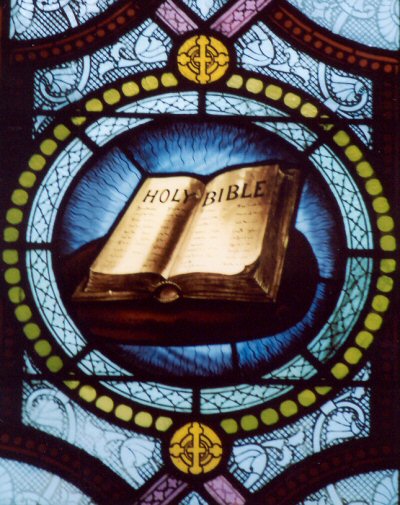 Liturgy
of the Word
Liturgy
of the Word
Christ is made known to us through the
Old Testament which prepares us to recognize Him. In those days, God
inspired men who spoke His message. Now, the New Testament Gospel reading
announces His presence to us directly through His Son. Both
readings bring God's message to us. Our responsibility is to respond.
The First Reading:
From the Old Testament.
2 Kings 4:42-44
A man came from Ball-shalishah
bringing to Elisha, the man of God, twenty barley loaves made from the
firstfruits, and fresh grain in the ear. Elisha said, “Give it to the people to
eat.” But his servant objected, “How can I set this before a hundred people?”
Elisha insisted, “Give it to the people to eat. For thus says the Lord, ‘They
shall eat and there shall be some left over.’” And when they had eaten, there
was some left over, as the Lord had said.
Priest/Reader:
The Word of the
Lord.
All:
Thanks
be to God.
The Responsorial Psalm:
This Psalm praising God, is a prayer to God,
or recommends the practice of virtue. It is sung as an interlude between
the scriptural readings. It provides yet another instructional setting and
invites the assembly to imitate the cantor who sings a repeated response to the
verses of an ancient Psalm many of which are attributed to King David. The
verses are sung first by a cantor (song leader) accompanied by instruments, the
refrain is sung by the people.
Responsorial
Psalm 145:10-11, 15-16, 17-18
Cantor: The hand of the Lord
feeds us; he answers all our needs.
All: R/. The
hand of the Lord feeds us; he answers all our needs.
Cantor: Let all your works give you thanks, O Lord, and let
your faithful ones bless you. Let them discourse of the glory of your kingdom
and speak of your might.
All: R/. The
hand of the Lord feeds us; he answers all our needs.
Cantor: The eyes of all look hopefully to you, and you give
them their food in due season; you open your hand and satisfy the desire of
every living thing.
All: R/. The
hand of the Lord feeds us; he answers all our needs.
Cantor:
The Lord is just in all his ways and holy in
all his works. The Lord is near to all who call upon him, to all who call upon
him in truth.
All: R/. The
hand of the Lord feeds us; he answers all our needs.
The Second Reading:
Taken from the New Testament,
from a letter written by St. Paul.
Ephesians 4:1-6
Brothers and sisters:
I,
a prisoner for the Lord, urge you to live in
a manner worthy of the call you have received, with all humility and gentleness,
with patience, bearing with one another through love, striving to preserve the
unity of the spirit though the bond of peace: one body and one Spirit, as you
were also called to the one hope of your call; one Lord, one faith, one baptism;
one God and Father of all, who is over all and through all and in all.
The Alleluia:
An ancient expression of joy anticipating
the Lord's message we will hear in the Gospel.
Luke 7:16
Cantor: Alleluia!
Alleluia! Alleluia!
ALL: R/. Alleluia! Alleluia! Alleluia!
Cantor: A great prophet has risen in our midst. God
has visited his people.
ALL: R/. Alleluia! Alleluia! Alleluia!
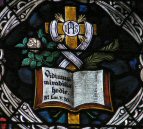 The Gospel:
The Liturgy of the Word is completed
by the reading of the Gospel. Before its reading, the members of the
assembly trace the sign of the cross upon the forehead to indicate their mental
acceptance of the Truth, on the lips to indicate their readiness to announce it,
and over the heart to indicate their sincere desire to accept it into their
lives. The "Good News" of the Gospel tells that God's kingdom has come for
all to hear, accept, and announce to the world for its salvation. It
is God who is speaking to us. Christ comes to teach us by the example of
His life and by His own words.
The Gospel:
The Liturgy of the Word is completed
by the reading of the Gospel. Before its reading, the members of the
assembly trace the sign of the cross upon the forehead to indicate their mental
acceptance of the Truth, on the lips to indicate their readiness to announce it,
and over the heart to indicate their sincere desire to accept it into their
lives. The "Good News" of the Gospel tells that God's kingdom has come for
all to hear, accept, and announce to the world for its salvation. It
is God who is speaking to us. Christ comes to teach us by the example of
His life and by His own words.
Priest: Cleanse my heart and my lips, almighty God, that I may worthily proclaim your
holy Gospel. Through the words of the Gospel may our sins be wiped away.
Priest: The Lord be with you.
All: And with our spirit.
Priest/Deacon: A
reading from the holy Gospel according
to John.
All: Glory
to you, Lord.
The Gospel: John 6:1-15
John wrote to show that Christ was
the Messiah, the Divine Son of God.

Jesus went across the Sea
of Galilee. A large crowd followed him, because they saw the signs he was
performing on the sick. Jesus went up on the mountain, and there he sat down
with his disciples. The Jewish feast of Passover was near. When Jesus raised
his eyes and saw that a large crowd was coming to him, he said to Philip, “Where
can we buy enough food for them to eat?” Philip answered him, “Two hundred
days’ wages worth of food would not be enough for each of them to have a
little.” One of his disciples, Andrew, the brother of Simon Peter, said to him,
“There is a boy here who has five barley loaves and two fish; but what good are
these for so many?” Jesus said, “Have the people recline.” Now there was a
great deal of grass in that place. So the men reclined, about five thousand in
number. Then Jesus took the loaves, gave thanks, and distributed them to those
who were reclining, and also as much of the fish as they wanted. When they had
had their fill, he said to his disciples, “Gather the fragments left over, so
that nothing will be wasted.” So they collected them, and filled twelve wicker
baskets with fragments from the five barley loaves that had been more than they
could eat. When the people saw the sign he had done, they said, “This is truly
the Prophet, the one who is to come into the world.” Since Jesus knew that they
were going to come and carry him off to make him king, he withdrew again to the
mountain alone.
Priest: The
Gospel of the Lord.
All: Praise to you, Lord Jesus Christ.
Priest: Through the words of the Gospel may our sins be wiped
away.
The Priest's Sermon:
The priest develops, explains, and comments upon the Master's words,
so our minds may be
enlightened, and our
hearts enriched.
(A priestly reflection upon this Gospel)
Profession of Faith:
We state in the
Nicene Creed the principles of our faith in precise and definite terms.
All: I believe in one God, the Father, the Almighty,
maker of heaven and earth, of all that is seen and unseen. I believe in
one Lord, Jesus Christ, the Only Begotten Son of God, born of the Father before
all ages.
God from God, Light from Light, true God from true God, begotten, not made,
consubstantial with the Father; through him all things were made. For us
men and for our salvation he came down from heaven, and by the Holy
Spirit was incarnate of the Virgin Mary, and became man. For our sake he was
crucified under Pontius Pilate, he suffered death and was buried, and rose again
on the third day in accordance with the Scriptures. He ascended into
heaven and is seated at the right hand of the Father. He will come again
in glory to judge the living and the dead and his kingdom will have no end.
I believe in the Holy Spirit, the Lord, the giver of life, who proceeds from
the Father and the Son, who with the Father and the Son is adored and
glorified, who has spoken through the prophets. I believe in one,
holy, catholic and apostolic Church. I confess one Baptism for the
forgiveness of sins and I look for the resurrection of the dead and the
life of the world to come. Amen.
General Intercessions:
We pray for the needs of the pope, civic
leaders, our own needs, those of others,
the sick, the dying, those who have died, the church, and the world.
The response of all to each intercession: Lord, hear our prayer.
All: Lord,
hear our prayer.
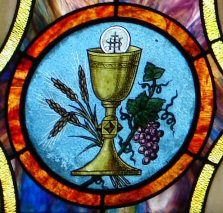 The Liturgy of the Eucharist
The Liturgy of the Eucharist
Gifts of bread and wine
symbolizing ourselves are presented to the priest who will offer them to God the
Father. Through the Holy Spirit, they will become the Body and Blood of
Jesus Christ whom we receive in Holy Communion. Jesus unites Himself with
us for our spiritual nourishment and strength. Today, when individuals do
not present their own personal offerings of bread and wine, the monetary contribution
symbolizes the material of their united sacrifice. The priest makes and
offering of the bread and wine to God.
Preparation of the Bread and
Wine:
Priest: Blessed are you, Lord God of all creation,
for through your goodness we have received the bread we offer you:
fruit of the earth and work of human hands, it will become for us the bread of
life.
All:
Blessed be God for ever.
Priest: By
the mystery of this water and wine may we come to share in the divinity of
Christ, who humbled himself to
share
in our humanity.
Priest: Blessed are you, Lord God of all creation, for through your goodness we have
received the wine we offer you; fruit
of the vine and work of human hands it will become our spiritual drink.
All: Blessed be God for ever.
Priest: With
humble spirit and contrite heart may we be accepted by you, O Lord, and may our
sacrifice in your sight this
day be pleasing to you, Lord God.
The Priest's Hands are Washed: This
act was traditionally necessary because the priest handled the various gifts
presented by the people. Now, the cleansing act using water reminds the
priest and ourselves of the need to cleanse not only the hands but the soul.
Soon, the priest's hands will hold the actual body of Christ, and we will become
His dwelling place.
Priest: Wash
me O Lord, from my iniquity and cleanse me from my sin.
Pray, brethren, that
my sacrifice and yours may be acceptable to God, the almighty Father.
All: May the Lord accept the sacrifice at your hands for the praise and glory of his
name, for our good and the good of
all his holy Church.
Prayer over the Gifts:
Speaking in our name, the priest asks
the Father to accept the gifts we offer through him.
Priest: O God,
who in the offerings presented here provide for the twofold needs of human
nature, nourishing us with food and renewing us with your Sacrament, grant, we
pray, that the sustenance they provide may not fail us in body or in spirit.
Through Christ our Lord.
Eucharistic Prayer:
(Number Two: The priest may select from several forms).
Priest: The Lord be with you.
All: And with your
spirit.
Priest: Lift up your hearts.
All: We lift them up to the Lord.
Priest: Let us give thanks to the Lord, our God.
All: It is right
and just.
Preface Prayer:
It is truly right and just, our duty and our
salvation, always and everywhere to give you thanks, Lord, holy Father, almighty
and eternal God, through Christ our Lord. His Death we celebrate in love,
his Resurrection we confess with living faith, and his Coming in glory we await
with unwavering hope. And so, with all the Angles and Saints, we praise
you, as without end we acclaim:
Acclamation:
Priest
and All:
Holy, Holy, Holy Lord, God of hosts. Heaven and
earth are full of your glory. Hosanna in the highest.
Blessed
is he who comes
in the name of the Lord. Hosanna in the highest.
Priest: You are indeed Holy, O Lord, the fountain of all
holiness. Make holy, therefore, these gifts, we pray, by sending down your
Spirit upon them like the dewfall, so that they may become for us the Body and
Blood of our Lord Jesus Christ.
The priest repeats
the words which Christ used at his Last Supper when He changed the bread into
His Body and the wine into His Blood. His Body and Blood are truly present
but under the appearance of bread and wine. The death of Christ is
prolonged in
each of those who receive Him worthily. We apply His
death to ourselves so that we may share His glory. This moment is the
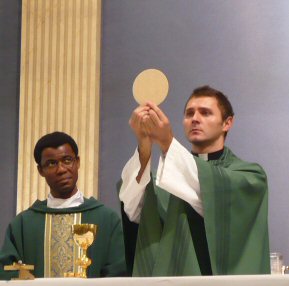 most
solemn on earth because it is Divine act which enables us to apply to ourselves
the Cross which Christ willingly took upon Himself.
most
solemn on earth because it is Divine act which enables us to apply to ourselves
the Cross which Christ willingly took upon Himself.
We are called to die to sin and
lift our very selves to God so that we become changed; to do as God would have
us do, to become what God would have us become. Our own little cross can
lift us into union with Christ's Cross so we may earn the joys of everlasting
happiness with God the Father.
The
Lord's Supper:
At the time he was betrayed and entered
willingly into his Passion, he took bread and, giving thanks, broke it, and gave
it to his disciples, saying:
Take this, all of you, and eat of it, for this is my Body, which will be given
up for you.
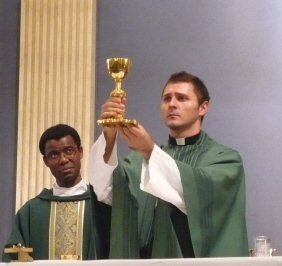 In
a similar way, when supper was ended, he took the chalice and, once more giving
thanks, he gave it to his disciples, saying:
In
a similar way, when supper was ended, he took the chalice and, once more giving
thanks, he gave it to his disciples, saying:
Take this, all of you, and
drink from it, for this is the chalice of my Blood, the Blood of the new and
eternal covenant, which will be poured out for you and for many for the
forgiveness of sins. Do this in memory of me.
Memorial Acclamation: (The priest may
select from several forms).
Priest: The
mystery of faith.
Priest
/ All: Save us,
Savior of the world, for by your Cross and Resurrection you have set us free.
Memorial Prayer: (The
priest may select from several forms).
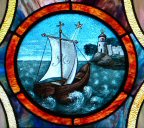 Priest:
Priest:
Recalls Christ's Passion, Resurrection, Ascension, the Church,
the dead, and ourselves.
Therefore, O Lord, as we celebrate the memorial of his Death and
Resurrection, we offer you, Lord, the Bread of life and the Chalice of
salvation, giving thanks that you have held us worthy to be in your presence and
minister to you. Humbly we pray that, partaking of the Body and Blood of
Christ, we may be gathered into one by the Holy Spirit.
Remember, your Church, spread throughout the
world, and bring her to the fullness of charity, together with _____ our Pope,
and _____ our Bishop, and all the clergy. Remember also our brothers and
sisters who have fallen asleep in the hope of the resurrection, and all who have
died in your mercy: welcome them into the light of your face. Have mercy
on us all, we pray, that with the Blessed Virgin Mary, Mother of God, with the
blessed Apostles, and all the Saints who have pleased you throughout the ages,
we may merit to be coheirs to eternal life, and may praise and glorify you
through your Son, Jesus Christ.
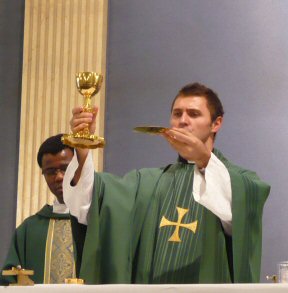 Prayer of Praise:
Through
him, with him, and in him, O God, almighty Father, in the unity of the Holy
Spirit, all glory and honor is yours, for ever and ever.
Prayer of Praise:
Through
him, with him, and in him, O God, almighty Father, in the unity of the Holy
Spirit, all glory and honor is yours, for ever and ever.
All: Amen.
Communion Rite
In the Liturgy of the Eucharist, we
symbolically offer ourselves to the Lord through the gifts of bread and wine.
At the Consecration, we offer our very lives to be united the God the Father
through the Cross of Christ. In Communion, we find that we have not died
at all, but have come to life. We have surrendered ourselves to God
through His Divine Son, Jesus Christ. In return become ennobled and
enriched. We give up time and we get eternity, we give up our sin and we
receive grace, we surrender our self-will and receive the strength of the Divine
Will, we give up ourselves and we receive everything. For the Son of God
says to us that unless we receive Him we shall not have Divine life in us.
But it is not really we who receive Christ as it is Christ who receives us,
bringing us into Himself.
God makes His Cross the very means
of our salvation and our life. While we have crucified Him, His eternal
love cannot be extinguished. Christ willed to give us the very life we
crucified in our Redemption, the Consecration of Holy Thursday into Communion,
His death into our everlasting life.
The Lord's
Prayer:
Priest: At
the Savior's command and formed by divine teaching, we dare to say:
Priest and
All: Our
Father, who art in heaven, hallowed be they name; Thy kingdom come; Thy will be
done on earth as it is in
heaven. Give us this
day our daily bread, and forgive us our trespasses, as we forgive those who
trespass against us; and lead us not into temptation, but deliver us from evil.
Priest: Deliver us, Lord, we pray, from every evil, graciously
grant peace in our days, that, by the help of your mercy, we may be always free
from sin and safe from all distress, as we await the blessed hope and the coming
of our Savior, Jesus Christ.
All: For the
kingdom, the power and the glory are yours now and forever.
Prayer for
Peace:
Priest: Lord Jesus Christ, who said to your Apostles: Peace I leave
you, my peace I give you, look not on our sins, but on the faith of your Church,
and graciously grant her peace and unity in accordance with your will. Who
live and reign for ever and ever.
All: Amen.
Priest: The peace of the Lord be with
you always.
All: And with your spirit.
Priest: Let us offer each other the sign of peace.
Breaking of the Bread:
Priest: May this mingling of the Body and Blood of our Lord
Jesus Christ bring eternal life to us who receive it.
Priest and All: Lamb of God, you take away the sins of the world,
have mercy on us.
Lamb of God, you take away the sins of the world, have mercy on us.
Lamb of God, you take away the sins of the world, grant us peace.
Priestly Preparation: May the receiving of your Body and
Blood, Lord Jesus Christ, not bring me to judgment and condemnation, but through
your loving mercy be for me protection in mind and body and a healing remedy.
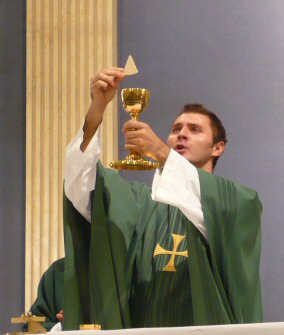 Priest: Behold
the Lamb of God, behold him who takes away the sins of the world. Blessed
are those called to the supper of the Lamb.
Priest: Behold
the Lamb of God, behold him who takes away the sins of the world. Blessed
are those called to the supper of the Lamb.
Priest and All: Lord,
I am not worthy that you should enter under my roof, but only say the world and
my soul shall be healed.
Priest: May the Body of Christ keep me safe for eternal life.
May the Blood of Christ keep me safe for eternal life.
Communion Antiphon:
Psalm 103:2
Bless
the Lord, O my soul, and never forget all his benefits.
Communion of the Faithful:
Priest:
The Body of Christ.
The Faithful: Amen.
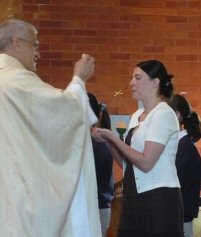
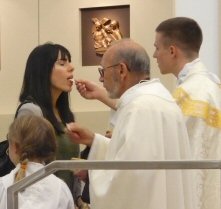
Priest/Deacon/
Extraordinary Eucharistic Minister:
The Blood of Christ.
The Faithful: Amen.
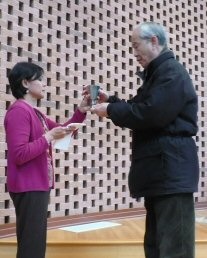
Cleansing of the Vessels:
Priest: What has passed our lips as food, O Lord, may we
possess in purity of heart, that what has been given to us in time may be our
healing for eternity.
Prayer after Communion:
Priest: Let us pray.
Priest: We
have consumed, O Lord, this divine Sacrament, the perpetual memorial of the
Passion of your son; grant, we pray, that this gift, which he himself gave us
with love beyond all telling, may profit us for salvation. Through Christ
our Lord.
Concluding Rite
Priest: The Lord be with you.
All: And
with your spirit.
Priest: Bow
down for the blessing.
Dismissal Prayer: (The priest may select
from several forms)
Priest: May your heavenly favor, O Lord, we pray, increase in
number the people subject to you and make them always obedient to your commands.
Through Christ our Lord.
All: Amen.
Priest: Go in peace, glorifying the Lord at all times.
All: Thanks be to God.
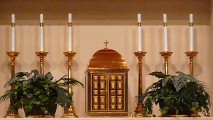 O my Jesus, forgive us our sins.
O my Jesus, forgive us our sins.
Save us from the fires of hell.
Lead all souls to heaven,
especially those in most need of your mercy.
www.Divinemasterplanforlife.com
www.Saintsnheaven.com
Top
Home Page
Liturgical
Year Cycle B 11-12
 Liturgy
of the Word
Liturgy
of the Word The Gospel:
The Liturgy of the Word is completed
by the reading of the Gospel. Before its reading, the members of the
assembly trace the sign of the cross upon the forehead to indicate their mental
acceptance of the Truth, on the lips to indicate their readiness to announce it,
and over the heart to indicate their sincere desire to accept it into their
lives. The "Good News" of the Gospel tells that God's kingdom has come for
all to hear, accept, and announce to the world for its salvation. It
is God who is speaking to us. Christ comes to teach us by the example of
His life and by His own words.
The Gospel:
The Liturgy of the Word is completed
by the reading of the Gospel. Before its reading, the members of the
assembly trace the sign of the cross upon the forehead to indicate their mental
acceptance of the Truth, on the lips to indicate their readiness to announce it,
and over the heart to indicate their sincere desire to accept it into their
lives. The "Good News" of the Gospel tells that God's kingdom has come for
all to hear, accept, and announce to the world for its salvation. It
is God who is speaking to us. Christ comes to teach us by the example of
His life and by His own words.
 The Liturgy of the Eucharist
The Liturgy of the Eucharist most
solemn on earth because it is Divine act which enables us to apply to ourselves
the Cross which Christ willingly took upon Himself.
most
solemn on earth because it is Divine act which enables us to apply to ourselves
the Cross which Christ willingly took upon Himself.  In
a similar way, when supper was ended, he took the chalice and, once more giving
thanks, he gave it to his disciples, saying:
In
a similar way, when supper was ended, he took the chalice and, once more giving
thanks, he gave it to his disciples, saying: Priest:
Priest:  Prayer of Praise:
Through
him, with him, and in him, O God, almighty Father, in the unity of the Holy
Spirit, all glory and honor is yours, for ever and ever.
Prayer of Praise:
Through
him, with him, and in him, O God, almighty Father, in the unity of the Holy
Spirit, all glory and honor is yours, for ever and ever. Priest: Behold
the Lamb of God, behold him who takes away the sins of the world. Blessed
are those called to the supper of the Lamb.
Priest: Behold
the Lamb of God, behold him who takes away the sins of the world. Blessed
are those called to the supper of the Lamb. 


 O my Jesus, forgive us our sins.
O my Jesus, forgive us our sins.